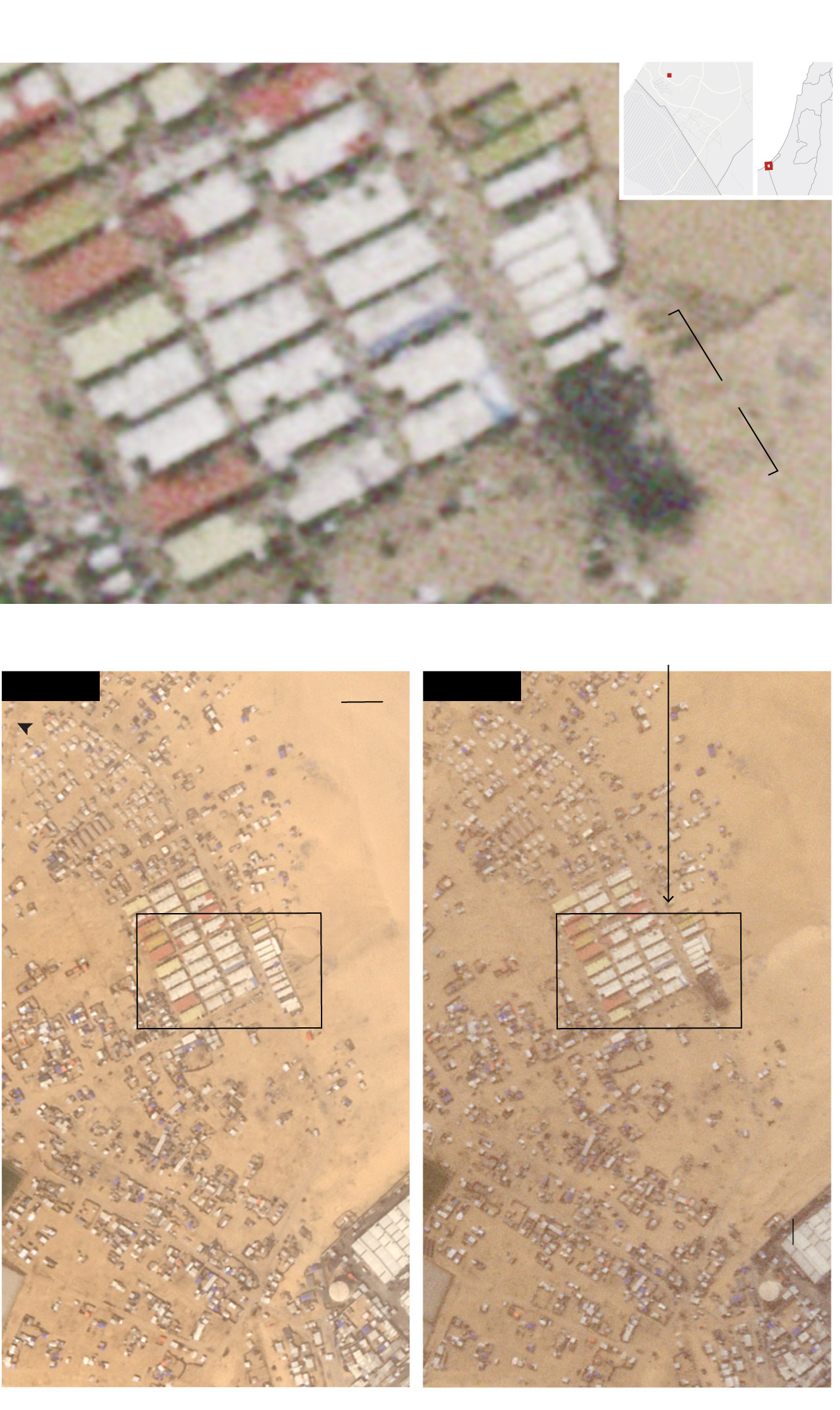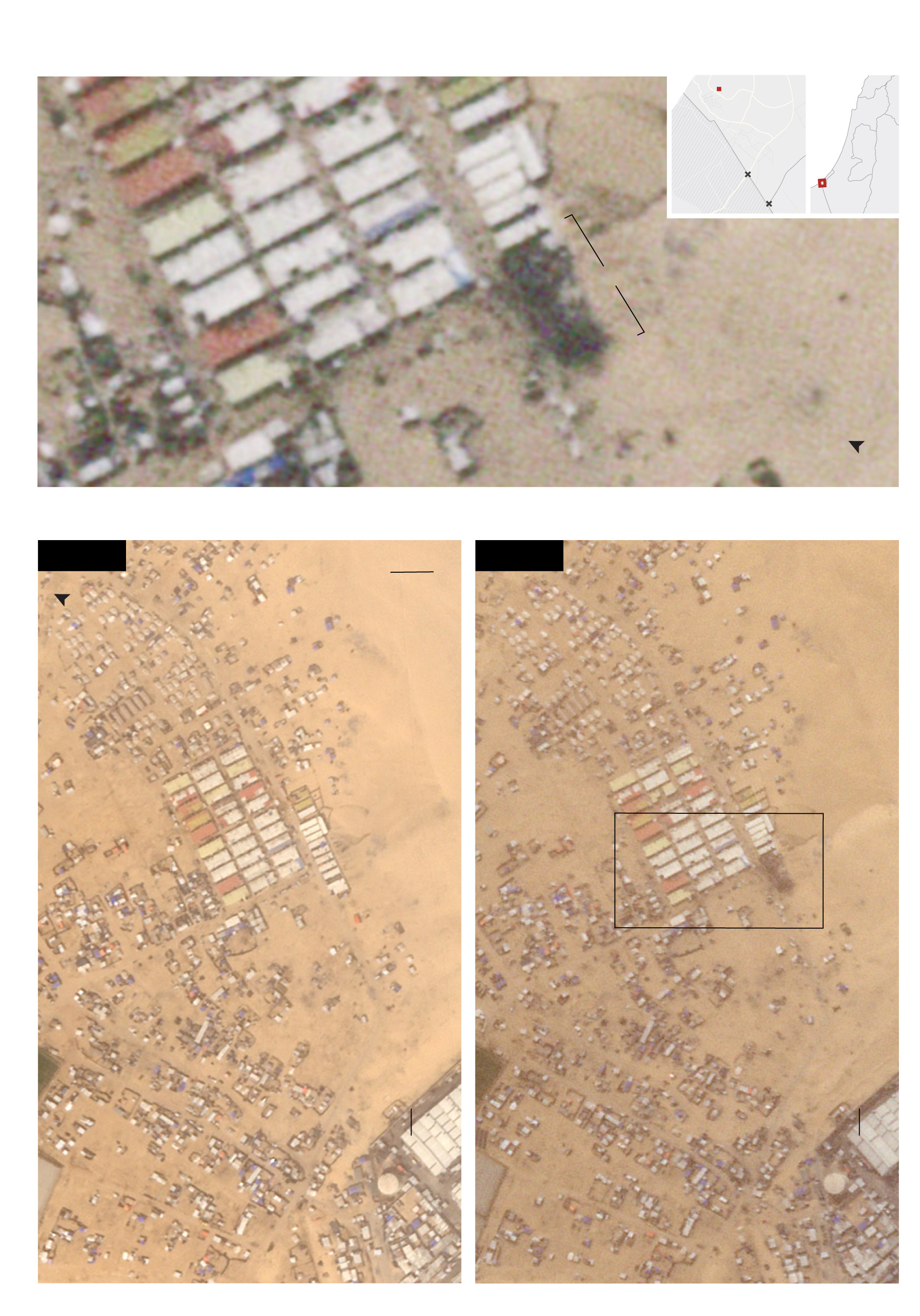The Israel Defense Forces, in a statement Tuesday, said it “did not strike in the humanitarian area in al-Mawasi,” referring to a zone along Gaza’s coast. Witnesses said the strikes occurred just south of the humanitarian zone.
Witnesses described hearing explosions around 2:30 p.m. local time. Nidal Wahba, 58, said the first blast occurred about 200 yards from his house. As he left to investigate, a second explosion struck a tent belonging to another family, where he saw dozens of casualties and “bodies thrown everywhere.” He said he found his 38-year-old daughter, Reham, suffering from a head injury and covered in blood.
Wahba said he believed the explosions were caused by artillery fire, rather than airstrikes, because of the shallow depth of the craters.
GET CAUGHT UP
Summarized stories to quickly stay informed
Another witness, 37-year-old Osama al-Bayouk, said in a phone interview that two of his daughters were hurt in the strikes — one of them, Leah, 14, critically. “I cannot describe what I saw, dozens of martyrs, blood everywhere, people slaughtered,” he said from the intensive care unit of a hospital run by International Medical Corps. “I hope not to hear the news of her death today, and that God will breathe life into her.”
First responders in Rafah reported several Israeli attacks during the day, with Gaza’s civil defense crews saying in a statement they had come under fire from planes and snipers as well as artillery shells in three incidents on Tuesday.
The IDF did not immediately respond to a request for comment but said in a statement Tuesday that it was continuing operations in Rafah, including in the Philadelphi Corridor area, as well as in Jabalya, northern Gaza and central Gaza.
The strikes came as the Israeli military announced the preliminary results of an investigation into another deadly strike at a tent camp in Rafah that killed 45 and drew worldwide condemnation.
The attack, which took place Sunday, targeted two senior Hamas militants and used “the smallest munition that our jets can use,” described as 37 pounds in weight, Israeli military spokesman Daniel Hagari told reporters. He said the ongoing investigation is looking into the possibility that “secondary explosions” linked to “weapons stored in a compound next to our target” ignited a deadly blaze.
“Our war is against Hamas, not against the people of Gaza,” Hagari said.
Israeli forces seized control of the Rafah border crossing in early May, shutting off the flow of aid through the crucial passage and forcing hundreds of thousands of civilians to flee. Israel has since expanded its ground incursion and intensified its bombardment of the area, despite assurances given to the United States of an “operation of limited scope, scale and duration,” National Security Council spokesman John Kirby said at the time.
Tal al-Sultan tent camp after
and before IDF’s strike
Makeshift accommodation
(visible in satellite from early January)
SAMUEL GRANADOS / THE WASHINGTON POST

Tal al-Sultan tent camp after
and before IDF’s strike
Makeshift accommodation
(visible in satellite from early January)
SAMUEL GRANADOS / THE WASHINGTON POST

Makeshift accommodation
(visible in satellite from early January)
Before and after IDF’s strike
SAMUEL GRANADOS / THE WASHINGTON POST

Makeshift accommodation
(visible in satellite from early January)
Before and after IDF’s strike
SAMUEL GRANADOS / THE WASHINGTON POST
More than a dozen international aid agencies, among them Oxfam and the Norwegian Refugee Council, signed a joint letter released Monday calling on all members of the U.N. Security Council to enforce an order by the International Court of Justice for Israel to halt military operations in Rafah.
Despite the legal order, the letter said, “the bloodshed has continued.” A failure by the Security Council to act “would undermine global trust in the primacy of international law,” the letter added.
The Pentagon announced Tuesday that it had halted the delivery of aid via the U.S.-built pier in Gaza after mishaps related to beached U.S. Army vessels and bad weather. Recent damage to the pier caused by rough conditions on the water will require the U.S. military to remove parts of the pier and rebuild them with Israeli assistance at the nearby Ashdod port. “The pier proved highly valuable in delivering aid to the people of Gaza,” said Sabrina Singh, a Pentagon spokeswoman said. “Thus, upon completion of the pier repair and reassembly, the intention is to re-anchor the temporary pier to the coast of Gaza and resume humanitarian aid to the people who need it most.”
Nearly 1 million people have fled Rafah in the past three weeks, the U.N. Relief and Works Agency (UNRWA) that aids Palestinian refugees reported, with that number expected to rise after the weekend’s strike. UNRWA tweeted Tuesday that there was “nowhere safe to go & amidst bombardments, lack of food & water, piles of waste & unsuitable living conditions” in Rafah. “Day after day, providing assistance & protection becomes nearly impossible,” it continued. The agency called for an immediate cease-fire.
Spain, Ireland and Norway formally recognized a Palestinian state on Tuesday, a week after they announced their intentions to do so. “The Government recognises Palestine as a sovereign and independent state and agreed to establish full diplomatic relations between Dublin and Ramallah,” Ireland’s government said in a statement, noting the “tragic backdrop to today’s announcement.” Norway said the recognition “represents a milestone in Norwegian-Palestinian relations.” Spanish Prime Minister Pedro Sánchez called it a “matter of historical justice” and necessary to “achieve peace.” Officials in Israel have criticized the decisions.
Egypt is investigating a shooting incident in the Rafah border area that killed a member of its security forces Monday. Israel confirmed a shooting and said it was also investigating. A former Egyptian official told The Post on Monday that details of the incident could be outlined by a joint committee Tuesday.
At least 36,096 people have been killed and 81,136 injured in Gaza since the war started, said the Gaza Health Ministry, which does not distinguish between civilians and combatants but says the majority of the dead are women and children. Israel estimates about 1,200 people were killed in Hamas’s Oct. 7 attack, including more than 300 soldiers, and it says 287 soldiers have been killed since the launch of its military operations in Gaza.
John Hudson contributed to this report.
